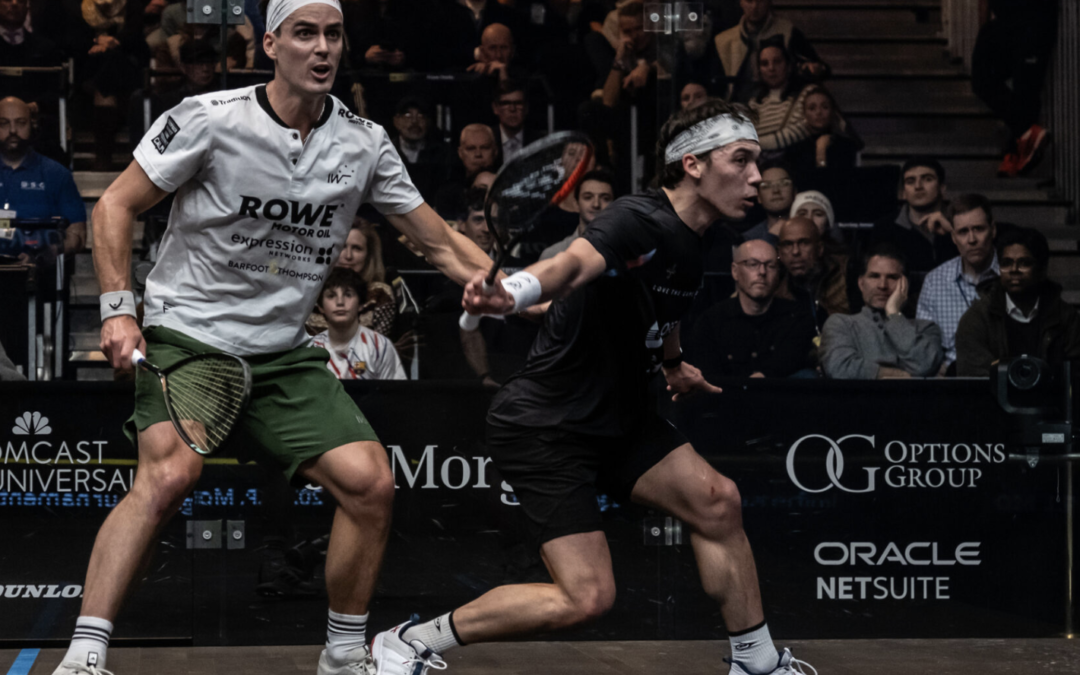Paul Coll (left) was tipped to thrash Victor Crouin (right) in New York on Monday night. And yet…
It’s the Tournament of Champions in New York. It’s a two-week squash competition that takes place at Grand Central Terminal. I’ve been twice and watched a ton of matches on Squash.tv.
But what does this have to do with helping you find your voice as a leader? Well, it’s simple. Beware negative self-talk. Notice it, put it aside, and keep talking to yourself in a positive way. That’s it. Also, beware overconfidence.
A good example of this happened on Monday night. A young French player named Victor Crouin beat a seasoned New Zealander, Paul Coll. Everybody expected Coll to walk it. People were wondering how many games Coll would win by. Nobody—me included—expected Crouin to win it. And I like him. Yet he did win it, in three decisive games. The first game lasted 33 minutes, about three times the length of an average game. Crouin kept pointing to his head as if to say, “keep focused, keep believing.” Meanwhile, Coll started off patient. He strutted around like the hare to the proverbial tortoise. The commentators said it wouldn’t matter if he lost the first game if he put some “work” into his opponent. He lost it. Then in the second game he started to seem a bit more petulant. He argued with a couple of the referee’s decisions. You could see he had gone from overconfident, to nervous, in about six points. He lost the second. The third game was a total collapse. Crouin was up five points. He smashed the winning ball into the lower right corner. I stood up in front of my laptop and applauded with glee.
Crouin ignored the voices saying he couldn’t win. To reach the quarter final, he’d already played two long, drawn-out matches. Nobody thought he had a chance. But he did. He kept focused on all the work and training he has put in to play the game and he backed it up. He backed himself.
Coll believed he couldn’t lose. He focused on his technique, almost to the extent that he forgot to play his opponent to win. By the time he realized he’d been overconfident it was too late. He had nothing to back it up. He had underestimated the risks.
I’ve written several times about squash being a great teacher for life. I love the game and I doubt whether any other sport combines athletic and mental development so well. One cannot only be fit and fast to win. One must think. But one can’t only think. It’s like the ultimate jedi training, for those who like Star Wars.
Here’s what’s at the root of all this. I had a fascinating moment in a therapy session 10 years ago. I’d said something, then I slapped myself in the face. My therapist stopped me and said, “I notice you slapped yourself in the face there, Matt. What’s that about?”
I had no idea. I’d responded to an impulse that came up as I was expressing a thought in a therapeutic setting. My natural impulse was to slap myself in the face. But yeah. What was that about?
It took me about another five years to notice more often when this kind of negative self-talk came up. When I was being harder on myself than a friend might be. And trust me, it was an awful lot. I had this intolerance of weakness in myself, even though I was often quite kind to other people. I had to work on it with intention and grace. I had to forgive myself when I fell short. I had to forgive myself for being unforgiving. I had to realize I’m only human like everybody else. It took me about 40 years to get comfortable with myself and even now, at 44, I still have the odd slip.
Then again, I was playing a squash game earlier this week with an opponent who beat themselves up. Every time they missed; they’d say something nasty about themselves. “That’s a crock of sh*t,” they said. I told them, “I notice you’re talking quite harshly to yourself. Oddly enough, squash is one of the few places where I rarely beat myself up. I might play badly, but I only started playing in my thirties, and I’m doing my best.”
That’s what’s at the heart of learning and finding my voice as a leader. How about you?
As leaders develop their voices, too many of us stop ourselves in our tracks. If you’re not sure you’re a leader, you’re a leader. Own it. We say we don’t deserve to get our voices out there and heard. We say other people’s opinions should have more weight and more value. But honestly? Look around you. Is the world doing superbly? Is everything on track for success? I don’t think so.
If you’ve got an opinion about what might make things better, it’s time to get in the game and believe in yourself. I can help because I understand the paralysis. But you can do this. Trust me. We all can. It’s just about developing that balance between backing ourselves, doing the work, and avoiding overconfidence. That’s how we step up and lead. It’s how we talk like leaders and persuade people to engage with and follow our example. I’m excited to hear if this strikes a chord with you. What do you think?


